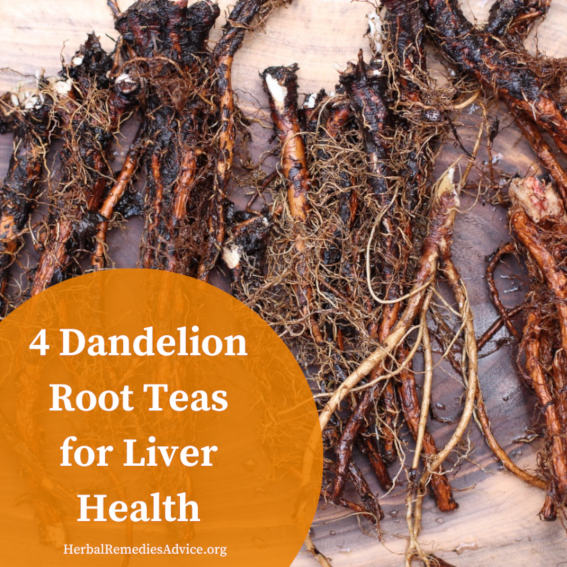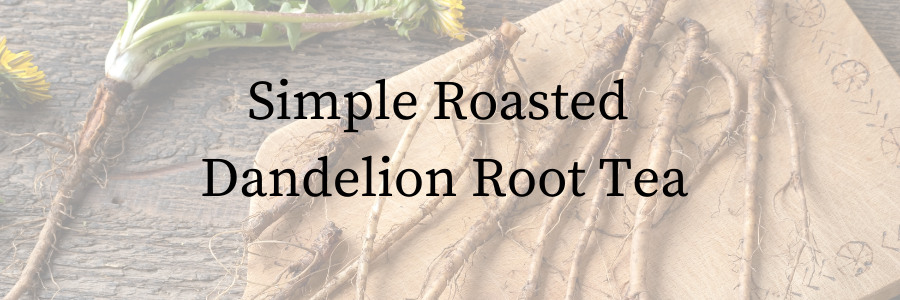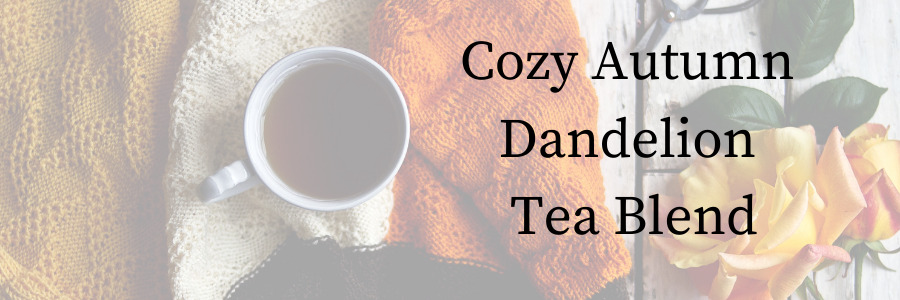Get weekly tips, recipes, and my Herbal Jumpstart e-course! Sign up for free today.

Benefits of Dandelion Tea
Share this! |
|
You can find exotic herbs for the liver all around the world but, hands down, my favorite liver all-star is the sun of the grasslands: dandelion.
Dandelion leaves are delicious spring greens that are delightfully bitter. Those tender green leaves often make their way into my salads and into pesto blends.
However, as I write this, I am staring out my office window to the 8 inches of new snow that have recently fallen. When I think of dandelion for these times, it’s not the greens that call to me but those earthy bittersweet roots. Rich roasted dandelion root teas are perfect for this cozy time of year.
Dandelion roots are loved for their ability to strengthen and nourish the liver. I have heard many case reports of them being used for severe liver issues like jaundice (which you would want to see a doctor for) or minor liver disturbances like difficulty digesting foods, especially fats.
Let me take a break from dandelion for just a moment to acknowledge that the liver is a wondrous organ! It participates in hundreds of different functions. In western systems of anatomy we often like to examine individual pieces of the body, even though we are constantly reminded that the body is an entire orchestra, working together, always. Amongst the many things it does, your liver helps to regulate cholesterol levels, is a key player in skin health, and is key to your hormonal system.
You can read more about the liver and its many roles here.
Liver health has long been a focus of herbalists and other holistically minded practitioners. In the past some herbalists have rooted their whole practice on addressing liver health (and digestion) first and foremost in their treatment plans.
With all that the liver does, it makes sense to give it some extra attention!
Dandelion roots frequently make their way into my everyday herbal remedies and traditions. Not to specifically address a liver problem, but instead as a way to maintain liver health. Of course dandelion roots are not limited to the liver and digestion! They are also high in nutrients and are being studied for the potential to address certain kinds of cancer.
There are many reasons to love dandelion!
Benefits of Dandelion Tea: How to Find Dandelion Roots
One of my favorite things about working with dandelion is that they are most likely growing near you! This ubiquitous and lovely weed grows all over the world! It goes by many names, but its botanical name, Taraxacum officinale, always stays the same.
I’m a fan of local medicine! I have the closest relationships with the plants that I can visit and interact with frequently. I also love knowing that I can make medicine from things I harvest from my own yard.
If you are new to foraging plants or wildcrafting then I recommend starting with our book, Wild Remedies: How to Forage Healing Foods and Craft Your Own Herbal Medicine. We have a whole chapter on dandelion roots that includes key identification, harvesting techniques and ecological connections.
You can also easily buy dandelion roots from your local apothecary or from online apothecaries like Mountain Rose Herbs. Look for organic roots. You can also buy roasted dandelion roots.
Benefits of Dandelion Tea: How to Roast Dandelion Roots
The following tea recipes use roasted dandelion roots. When you roast the roots it caramelizes the starchy sugars in the plant and gives the teas a rich and satisfying taste. It also slightly modulates that bitter flavor into something that is similar to coffee in its roasted flavor.
To roast dandelion roots, you’ll want them first to be cut into small pieces and thoroughly dried. Once dried, roast them in a dry cast iron pan on medium high heat, stirring frequently. You’ll know they are done when they have turned a darker shade of brown and have a rich aromatic smell. Avoid burning them.
You can also roast them in the oven at 350 degrees, checking on them frequently to stir and keep an eye on them to avoid burning. Once roasted you can store them in a dark, airtight container for up to a year.
Benefits of Dandelion Tea: Working with Dandelion Roots
Dandelions are extracted well when they are simmered (decocted) rather than simply infusing them as a tea. I am calling the following recipes Dandelion “Teas” because decoctions can be a strange word for folks although, admittedly, Dandelion Decoctions does have a ring to it.
Dandelion roots are high in minerals, which make them great as vinegar extractions. These can then be used in salad dressings or as drinking oxymels.
Dandelion roots are often made into a tincture. I like to add them as part of my bitter blends. But if I am specifically wanting to work with dandelion I more often prefer a tea or vinegar. With a tea you can get a much larger dosage and it doesn’t make sense to me to use lots of alcohol if you are wanting to support liver health.
Here are five teas to bring dandelion into your life!
Benefits of Dandelion Tea: How to Make Dandelion Tea
This simple roasted dandelion root tea is one of my favorite beverages. It’s warm and rich, slightly nutty and bitter in flavor. Many people call it a “coffee substitute” because of its rich roasted qualities. I like it with cream and piping hot in the winter. In the summer months I’ll take it chilled after spending days in the hot sun.
Yield: 1 serving
Ingredients
• 1 heaping Tablespoon (8 grams) of roasted dandelion root (Taraxacum officinale)
• 10 ounces of water
Simmer the root in the water for 20 minutes.
Strain. Add milk, honey or other sweetener as desired.
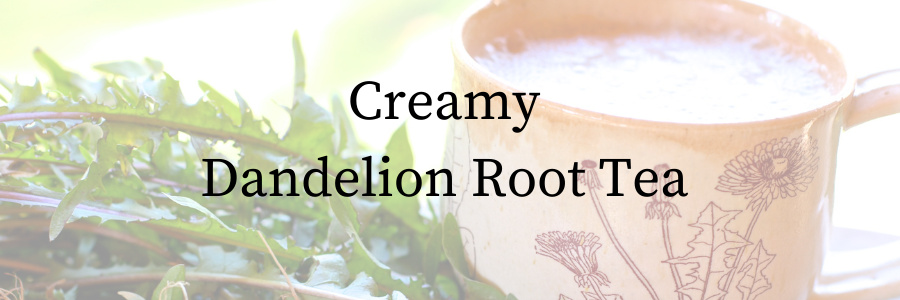
This is a lovely rich, roasted beverage that is perfect during the colder months. The addition of butter makes this a creamy and foamy drink, similar to a latte. The combination of dandelion roots and high quality butter offers many potential benefits for the liver and heart. Heavy cream can be substituted for the butter. Coconut cream can be a non-dairy alternative.
Yield: 1 serving
Ingredients
• 2 Tablespoons (15 grams) finely cut, dried and roasted dandelion roots (Taraxacum officinale)
• 16 ounces of water
• 1 Tablespoon butter
Place the dandelion roots and water in a small saucepan. Bring to a boil, then simmer uncovered for 20 minutes.
Strain. Reserve the liquid and compost the roots.
Place the butter and dandelion root tea in a blender. Blend on high for 2 minutes (taking any necessary precautions when blending a hot liquid - such as partially removing the lid to allow for steam to escape).
Pour into a cup and drink immediately.
One of the joys of the herbalist is to snuggle up with our favorite teas, books (or knitting) and sink into the season. I created this cozy blend to inspire you to enjoy some moments of peace.
Yield: 1 serving
Ingredients
- 1 Tablespoon dried blue or black elderberries (Sambucus spp)
- 1 Tablespoon dried oatstraw (Avena sativa)
- 2 teaspoons dried dandelion root (Taraxacum officinale)
- 1 teaspoon dried orange peel
- 14 ounces water
- honey or other sweetener as desired
Place the herbs and water in a small sauce pan.
Cover, bring to a boil, and reduce to a simmer for 20 minutes.
Strain. Add milk, honey or other sweetener as desired.
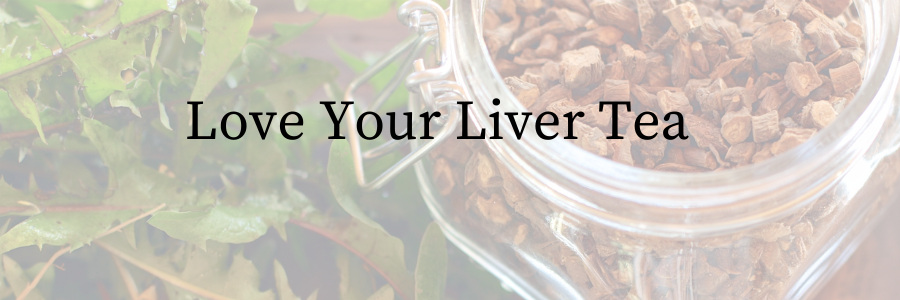
A delicious dark brew of roasted roots, cacao, orange and turmeric blends together to support your liver health. A wonderful way to start the day or as a compliment to sweet desserts.
Yield: 1 serving
Ingredients
• 2 teaspoons (7 grams) dried roasted dandelion root
• 1 teaspoon (3 grams) dried roasted chicory root
• 1 teaspoon (4 grams) cacao nibs
• 1/2 teaspoon (1 gram) orange peel
• 1/2 teaspoon (<1 gram) dried turmeric root
• small pinch freshly ground black pepper
• 16 ounces of water
Simmer the herbs in 16 ounces of water, covered, for 20 minutes.
Strain. Add milk, honey or other sweetener as desired.
Benefits of Dandelion Tea Recipe Cards
Click here to download the above Benefits of Dandelion Tea recipe cards!

Rosalee is an herbalist and author of the bestselling book Alchemy of Herbs: Transform Everyday Ingredients Into Foods & Remedies That Healand co-author of the bestselling book Wild Remedies: How to Forage Healing Foods and Craft Your Own Herbal Medicine. She's a registered herbalist with the American Herbalist Guild and has taught thousands of students through her online courses. Read about how Rosalee went from having a terminal illness to being a bestselling author in her full story here.
